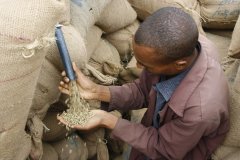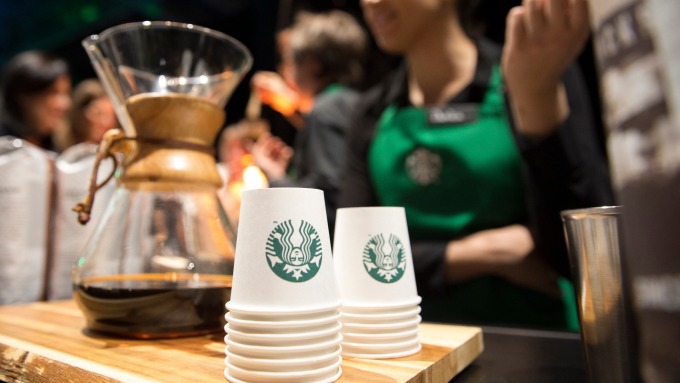Coffee farmers in rural Brazil will be able to use "coffee coins" for financing and purchase.

Professional coffee knowledge exchange more coffee bean information please follow the coffee workshop (Wechat official account cafe_style)
Coffee farmers in rural Brazil, through the plan of the Coffea arabica cooperative Minasul, will soon be able to use cryptocurrency to meet their daily needs.
Minasul is located in the state of Minas Gerais in southeastern Brazil, which is the world's largest coffee grower and exporter, and Minasul is one of the largest small fruit coffee bean cooperatives in the United States.
Jose Marcos Magalhaes, president of the large small fruit coffee bean cooperative Minasul, said in an interview at the Global Coffee Forum in Campinas, Sao Paulo, that the Minasul coffee bean cooperative plans to launch a blockchain-based cryptocurrency this month.
The encrypted currency will help farmers use "coffee coins" to buy fertilizers, machinery and other non-agricultural products, including cars and food, through the supply of coffee.
Magalhaes said that the stocks of fertilizers, machinery and other commodities for crops in Minasul cooperatives can guarantee the exchange of coffee coins and goods in the encrypted currency market. Allowing this type of cryptocurrency financing would "reduce costs for cooperatives and growers", he said, because it did not need to be registered through the offices of notaries.
Magalhaes added:
Farmers will be able to receive coffee coins based on coffee receipts in the current and future seasons. "
Among them, 30% of the current harvest, 20% of the crop harvest in the next season, and 10% of the seasonal harvest after that are eligible to be traded as coffee coins.
The project is part of a large digitization program carried out by Minasul cooperatives. The ultimate goal of the co-op is for farmers to sell their coffee beans directly from their smart phones.
The application of blockchain technology in agriculture is gradually increasing. Earlier this month, Etherisc, a decentralized insurance technology company, launched a blockchain-based insurance platform for Sri Lankan farmers, while Taiwan's new venture Odingdin worked with small farmers on the pool to jointly establish agricultural production performance through blockchain technology.
END
Important Notice :
前街咖啡 FrontStreet Coffee has moved to new addredd:
FrontStreet Coffee Address: 315,Donghua East Road,GuangZhou
Tel:020 38364473
- Prev

Guatemala first uses blockchain technology for coffee bidding in 2019
Professional coffee knowledge exchange More coffee bean information Please pay attention to coffee workshop (Weixin Official Accounts cafe_style) According to Guatemala Coffee Association (ANACAFE), it has conducted Guatemala coffee bidding with blockchain technology for the first time on May 24 this year. A total of Guatemala 21 coffee plantations participated in this activity, with a total bidding amount of US $116,281. International purchase
- Next

Why is it that when the price of coffee beans collapses, it becomes more expensive for stores to sell cups of coffee?
More information on coffee beans Please follow the coffee workshop (official Wechat account cafe_style) if growers set a minimum price for coffee beans to help hard-working farmers get paid for their work, consumers may have to pay more for coffee. Dozens of coffee plantation owners from Brazil to Colombia want to limit buyers' access to coffee, according to the Wall Street Journal.
Related
- Workers collapse! Lucky suspects that it will introduce freshly cut fruits?!
- 1-point subsidy recipients wear thousand-yuan watches?! Local response: For low-income households
- Can lightly roasted coffee beans be used to extract espresso? How finely should you grind high-quality coffee beans to make Italian latte?
- What is the difference between the world's top rose summer coffee and Yejia Shefi? What are the flavor characteristics of Yega Shefi coffee and Panama rose summer?
- The ceremony is full! Starbucks starts to cut the ribbon at a complimentary coffee station?!
- A whole Michelin meal?! Lucky launches the new "Small Butter Apple Crispy Latte"
- Three tips for adjusting espresso on rainy days! Quickly find the right water temperature, powder, and grinding ratio for espresso!
- How much hot water does it take to brew hanging ear coffee? How does it taste best? Can hot water from the water dispenser be used to make ear drip coffee?
- What grade does Jamaica Blue Mountain No. 1 coffee belong to and how to drink it better? What is the highest grade of Blue Mountain coffee for coffee aristocrats?
- What are the flavor characteristics of the world-famous coffee Blue Mountain No. 1 Golden Mantelin? What are the characteristics of deep-roasted bitter coffee?

